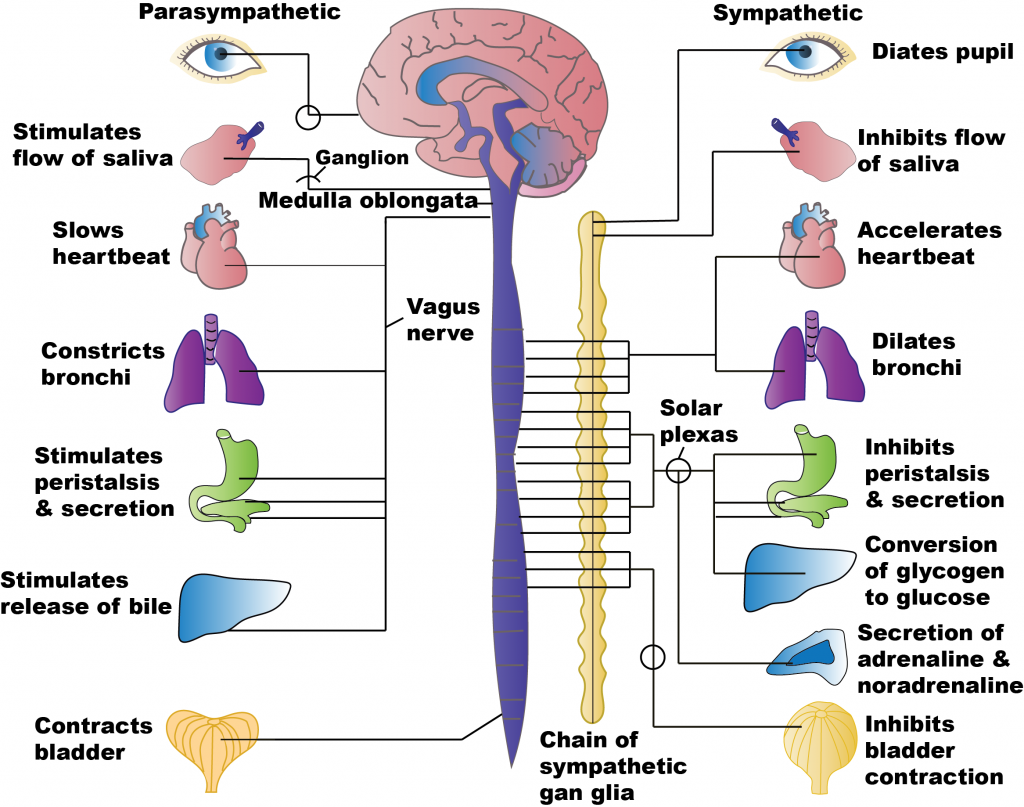A nurse is teaching a patient about a medication that alters sympathetic nervous system functions. To evaluate understanding, the nurse asks the patient to describe which functions the sympathetic nervous system regulates. Which answer indicates the need for further teaching?
“Body temperature”
“The cardiovascular system”
“The digestive functions of the body”
“The fight-or-flight response”
The Correct Answer is C
Choice A Reason:
The sympathetic nervous system (SNS) plays a role in regulating body temperature. It does this by controlling the dilation and constriction of blood vessels in the skin, which helps to dissipate or conserve heat as needed. Therefore, the statement that the SNS regulates body temperature is correct.
Choice B Reason:
The SNS is crucial in regulating the cardiovascular system. It increases heart rate and the force of heart contractions, and it also causes vasoconstriction, which raises blood pressure. This statement is accurate and does not indicate a need for further teaching.
Choice C Reason:
This is the correct answer. The SNS generally inhibits digestive functions during the “fight-or-flight” response. It reduces blood flow to the digestive organs, decreases peristalsis, and inhibits digestive secretions. Therefore, the statement that the SNS regulates digestive functions is incorrect and indicates a need for further teaching.
Choice D Reason:
The SNS is responsible for the “fight-or-flight” response, which prepares the body to respond to perceived threats. This includes increasing heart rate, dilating airways, and mobilizing energy stores. This statement is correct and does not indicate a need for further teaching.
Nursing Test Bank
Naxlex Comprehensive Predictor Exams
Related Questions
Correct Answer is C
Explanation
Choice A Reason:
The sympathetic nervous system (SNS) is responsible for the “fight or flight” response, which prepares the body to respond to perceived threats. One of the primary effects of SNS activation is an increase in heart rate. This is achieved through the release of catecholamines like adrenaline, which stimulate the heart to pump more blood to vital organs and muscles.
Choice B Reason:
Another effect of SNS activation is an increase in blood glucose levels. This occurs because the body needs more energy to respond to stress. The SNS stimulates the liver to release glucose into the bloodstream, ensuring that muscles and other tissues have enough energy to function effectively during a stressful situation.
Choice C Reason:
The correct answer is that SNS activation does not increase GI motility and movement. In fact, it has the opposite effect. During a “fight or flight” response, the body prioritizes functions that are critical for immediate survival, such as increased heart rate and blood flow to muscles. As a result, non-essential functions like digestion are slowed down. The SNS decreases GI motility and movement to divert energy and blood flow to more critical areas.
Choice D Reason:
SNS activation also leads to an increase in blood pressure. This is achieved by constricting blood vessels and increasing the force of heart contractions. The purpose of this response is to ensure that enough blood and oxygen are delivered to essential organs and muscles during a stressful situation.

Correct Answer is D
Explanation
Choice A Reason:
Tertiary prevention focuses on managing and mitigating the complications of an existing disease to prevent further deterioration. For obesity, this might involve interventions like bariatric surgery or intensive management of comorbid conditions such as diabetes or cardiovascular disease. In this scenario, the goal is not to prevent the onset of disease but to manage its long-term effects and improve quality of life.
Choice B Reason:
Disease treatment refers to the direct management of a diagnosed condition. For a diabetic teen, this could include medications like insulin or metformin, regular monitoring of blood glucose levels, and other medical interventions to control diabetes. While a low-calorie diet and exercise are important components of diabetes management, they are more aligned with preventive measures rather than direct treatment.
Choice C Reason:
Secondary prevention aims to detect and address a disease early in its course to prevent progression. This might include screening programs, early interventions, and lifestyle modifications for individuals at high risk of developing a condition. In the context of diabetes, secondary prevention could involve regular blood glucose monitoring and early dietary changes to prevent the progression from prediabetes to diabetes.
Choice D Reason:
Primary prevention involves measures taken to prevent the onset of a disease before it occurs. This includes lifestyle interventions such as a healthy diet, regular physical activity, and maintaining a healthy weight. For an obese diabetic teen, a prescription for a low-calorie diet and exercise program is aimed at preventing further weight gain and reducing the risk of developing additional health complications, making it a primary prevention strategy.
Whether you are a student looking to ace your exams or a practicing nurse seeking to enhance your expertise , our nursing education contents will empower you with the confidence and competence to make a difference in the lives of patients and become a respected leader in the healthcare field.
Visit Naxlex, invest in your future and unlock endless possibilities with our unparalleled nursing education contents today
Report Wrong Answer on the Current Question
Do you disagree with the answer? If yes, what is your expected answer? Explain.
Kindly be descriptive with the issue you are facing.
